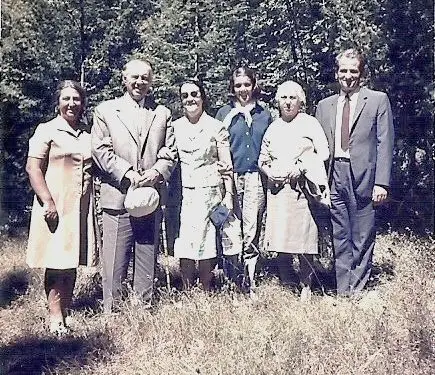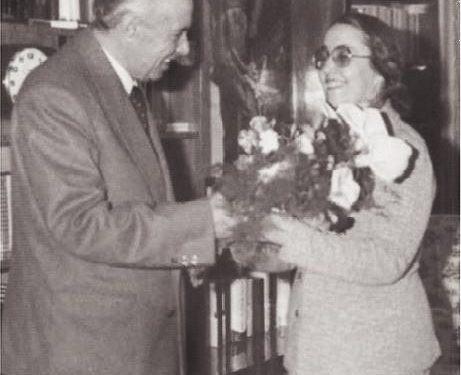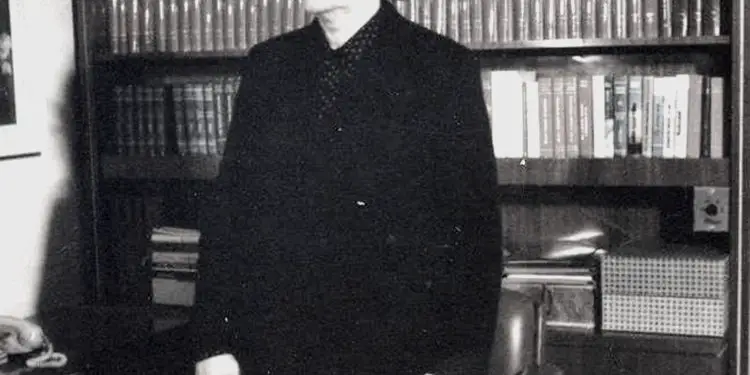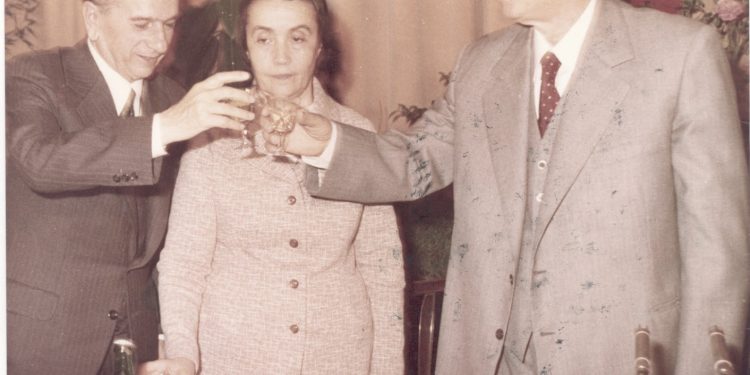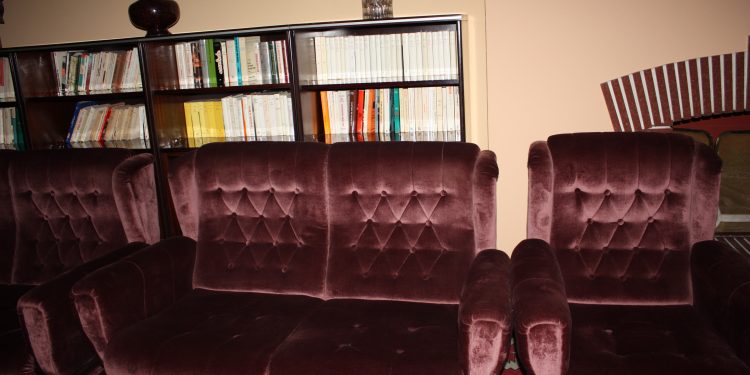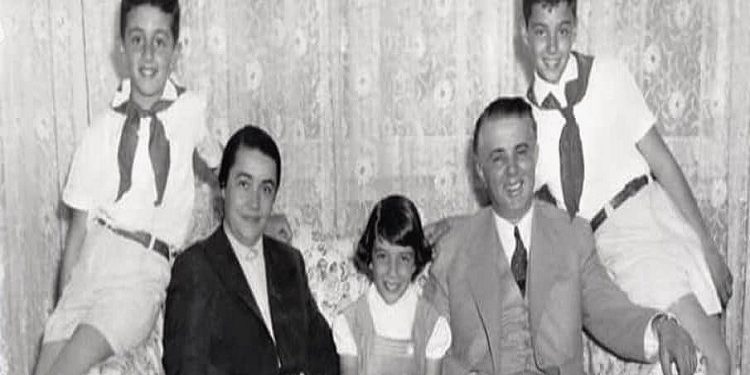By Ani Jaupaj
Zare Hoxha’s confession: “Nexhmija used to take the maids with her from Tirana; she wouldn’t let us enter the bedroom, while the doctor tried the dishes first”!
Memorie.al / As the daughter-in-law of her cousin, with whom Enver Hoxha grew up in the same house, Zare Hoxha, felt a little more “privileged” than her friends. At least the former dictator had helped her work as a maid in the Guest House in Gjirokastër. From there, she had the opportunity to get to know the former blockmen closely, from Enveri, whom she says treated her well, to Nexhmija, who was more “Zevzeke”, Mehmet Shehu, with his nervousness…, etc. !
Behind the house of the former dictator, Enver Hoxha, today the Ethnographic Museum of Gjirokastra, is an alley, which seems like it will take you nowhere, except through the yellow bushes that hung on the walls of the house. Actually no! There were two other house entrances, which had always remained in the background, even though the Hoxha surname of the owners was as famous as that of the historical house of the stone city. Even the shadow that fell on the plastic chair, where one of the ladies of the house, Zare Hoxha, was sitting, fell exactly from the high walls of the museum, which counted the number of visitors.
If you ask around the “Palorto” neighborhood, for Enver Hoxha’s contemporaries or his relatives, they all direct you to Zarja. It seemed as if they wanted to take her away, but in fact Zarja had a lot to say, because she lived in that house since 1947, when she married Enver Hoxha’s cousin, Feta Hoxha. Now, she spent the whole day, in the cool yard of her house, being disturbed from time to time by the memories of the past, about which today, there are not many people she can talk to. No matter how old she is, with a full 86 years on her shoulders and dressed all in black, she does not seem like one of those women, typical of Gyrokastrite, talkative.
Decades have passed since a bride came there, from Berat, and yet, she has not acquired the features of that southern area, which are immediately evident. She is one of those wise old women who you have to ask a few questions to get the answer to one. Only when the conversation flows through memories and they bring each other, her portrait is contoured and leaves exactly the taste of the first impression; of a woman always speechless, in her work, even though work, it was exactly; to serve the husband’s cousin, his wife, with grace and romance.
Ms. Zare, when did you come to this house as a bride?
If I remember correctly, it must have been the year ’47, when I got married in Gjirokastër and I came to live here, in the same place, that you came and found me today.
Has the house been the same, or have changes been made since then?
Necessary changes have been made, which takes time, but this was the same in the structure.
You are practically in the same yard, with the former house of Enver Hoxha. What relationship did your family have with him?
There was a house, because they were a tribe. Even those of us who live here have the same last name, Hoxha. My husband had a cousin, just like the other residents, who are left from the families of that time, who continue to live here.
If you came in 1947, the house that is shadowing you in the yard today should not have been like this, because it was burned. How did you find it?
Yes, it is true, when I first came here, his house was in ruins, all burnt and in disrepair.
What was the history of the burning, because some say it was due to the carelessness of Anna, others from the housekeeper…?!
The first story is, as they said then, because it was burned down years ago, that I came here, since ’24, as far as I know. They said that it happened due to the carelessness of the house cleaner, who had forgotten the magic and the wood, where she was washing the clothes near the fire, and from that it caught fire. The people of the house were there and they barely left the house at night, after midnight.
And what did you do, where did you work?
At first I was unemployed, I stayed at home for a long time, and until Enveri came to the positions he came to and put me to work at the Guest House in Gjirokastër, where I worked for years.
So you maintained a good relationship with him, had an in-and-out relationship?
Yes, they often came to the house, we talked. In one of the times, my husband told him to help me with work and I got settled there.
During his visits to Gjirokastra, he stayed where you worked… since you were close, did you have facilities at work?
What facilities, the work that had to be done, would be done, whatever you had. The responsibility was great; you had to be careful, in all the details, even though he has always behaved well with me. He tried to get close to me and did not treat me like the other housekeepers.
How specifically, tell us some details?
For example, when he came to the Reception House, he was friendly. He entered the kitchen by himself and asked us, “Hey, what good do we have today? Don’t do us light things” – he said. He wanted traditional, local cuisine.
Besides cheese, what else?
He did not share cheese at any table. The other thing he was looking for was the slipper, which you can also call the pispili. He was looking for beans, yaprak, popular things. Every time he came to the kitchen, he said: “We have the bride of the house, here.”
But how did it actually work, did these dishes have to be tried by someone else before he consumed them?
Yes, of course, the doctor was always with him, who entered the kitchen and asked what he had ordered, so that he could try them first.
Was Nexhmija with him, was he satisfied with the same popular dishes?
(The wise old woman, in order not to take any words out of her mouth more than necessary, seemed to wrinkle her lips a little at this question. What made her not escape the data of an answer anyway, as she thought). No, it wasn’t the same with him, there were claims. He saw that he had ordered, for example, the things I told you above, and he said: “Why, we will eat these”?! He was looking for light.
Which ones did he consider light?
Yes, he didn’t like it. “Why, we will eat the slippers”?! He said. He was looking for roast meat, meatballs, and quince. Anyway, these were also traditional dishes, but they required more work, they were considered heavier and better. Yes, in addition to pretensions in eating, she was also serious by nature, also in the way she said things, and how she asked for them. She was not popular, like her husband, who, in order to create a kind of family atmosphere, would come and greet us himself and ask us how work is going, or random things.
Did he treat you better than others?
Yes. He was always careful. I remember one time, when he was staying there; he rang the bell and asked me to make him a stone coffee, because we were pressing fresh coffee on a stone. He always drank it without sugar, because of diabetes. When there was no waitress, I would go and take it myself. After I took it to him, he rang the bell again and asked me to bring him another coffee, saying that he didn’t like the previous one. “Yes, I did it once,” I say. Because if he pointed this out, he would say that your blood becomes water.
In fact, he had asked for me a second time, because he knew that my husband, Fetau, had come out, and he ordered me to go and get him. When I found out why he had returned to me again, I told him; “That’s why you called me, Comrade Enver, you should know that I lost half a kilogram of blood.” “Well, he said, since you lost half a kilogram of blood, go to the kitchen, drink half a liter of wine and replace it immediately.” Then we laughed and he told me to take off my apron and join them for a coffee.
In this case, who served the coffee?
Other colleagues who worked there. I even remember that something happened to make me laugh, because I went back to the kitchen and told them what had happened to me, adding that they were the ones who should have served me a coffee. My college, tells me; “Do you hate me, why will I serve you coffee, in his eyes, huh”?! We laughed and in fact it happened, because the order was an order.
Did you have other advantages?
He himself helped me, every time he saw me on the street, when I was going home in the evening; he waved me to stop, to go by car. He called his companions to take me home, because when the leadership came to Gjirokastër, we finished very late, even after midnight. Then he phoned us at home, so that the attendants would not come to notify us about things or problems that might arise.
Besides him, who else has come from the leaders?
Many people came, among the most important, of course, was Hysni Kapo e, Mehmet Shehu. Hysniu has always left the impression of a wise man, as everyone said he was. I can’t say the same about Mehmet; he was irritable and got hot easily.
Why, what was he angry about?
Yes, even for unimportant things. For example, Enver liked parties, he liked music and comedy, and sometimes when he came, while he, together with Fiqiret, couldn’t stand them. When Enveri asked me: “Where is my friend Mehmet”? – “He’s gone” – I told him, because he took his wife and went to sleep in Përmet. “He ran away,” I told him, “he became nervous and couldn’t stand the noise”! While the others did not, they stayed, even Nexhmija enjoyed the party. In these cases, we were all anxious, that out of nervousness, Mehmet could even raise his voice, or say, that he didn’t like one thing or another.
There were times when you didn’t like something, did they react?
No, there wasn’t, because we were always very careful in everything we did or prepared. Apparently, there were also things that were not liked, but they did not tell us anything. We understood this, because Nexhmija always took her two maids from Tirana with her, even there in Gjirokastër. Her things, she wanted them to do them for her. For example, she wouldn’t let us into her room to fix the sheets or her clothes. They always did them.
(Zara’s lips twitched, it was quite natural, every time Nexhmije’s name was mentioned. It seemed that she was trying not to do it and not to say more things, but it was inevitable. No matter how hard we tried, we couldn’t we learn more about the details that added wrinkles to his face, every time the former dictator’s wife came up!)
How many children did you have? Did Enver Hoxha help you for their success, apart from putting you to work?
No, putting you to work was called help, it’s not like we had other advantages. I had six children, of whom only one got an officer’s scholarship, no matter how much we wanted him to become a doctor. We couldn’t even fix that. However, they worked and became masters of themselves, despite everything. Memorie.al




